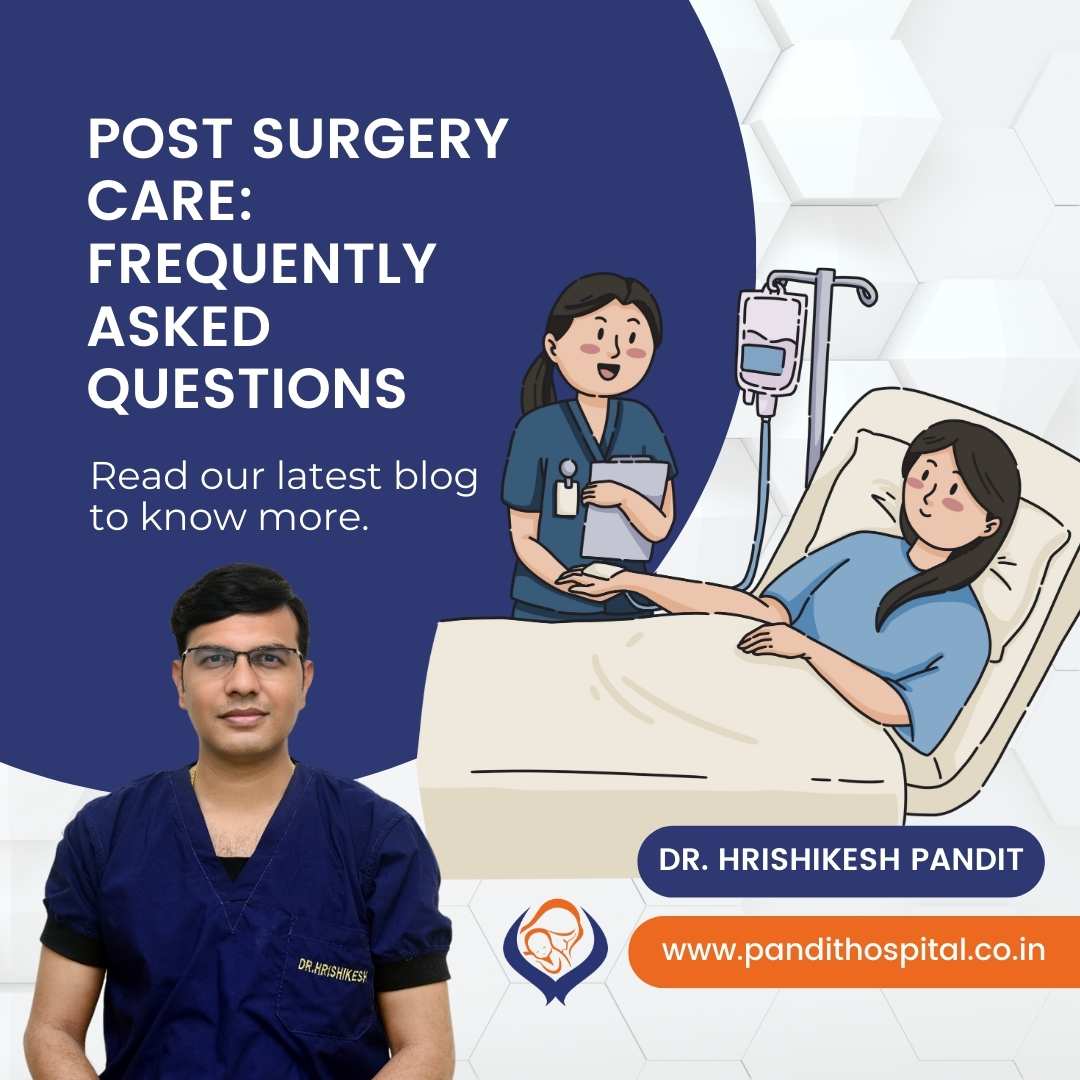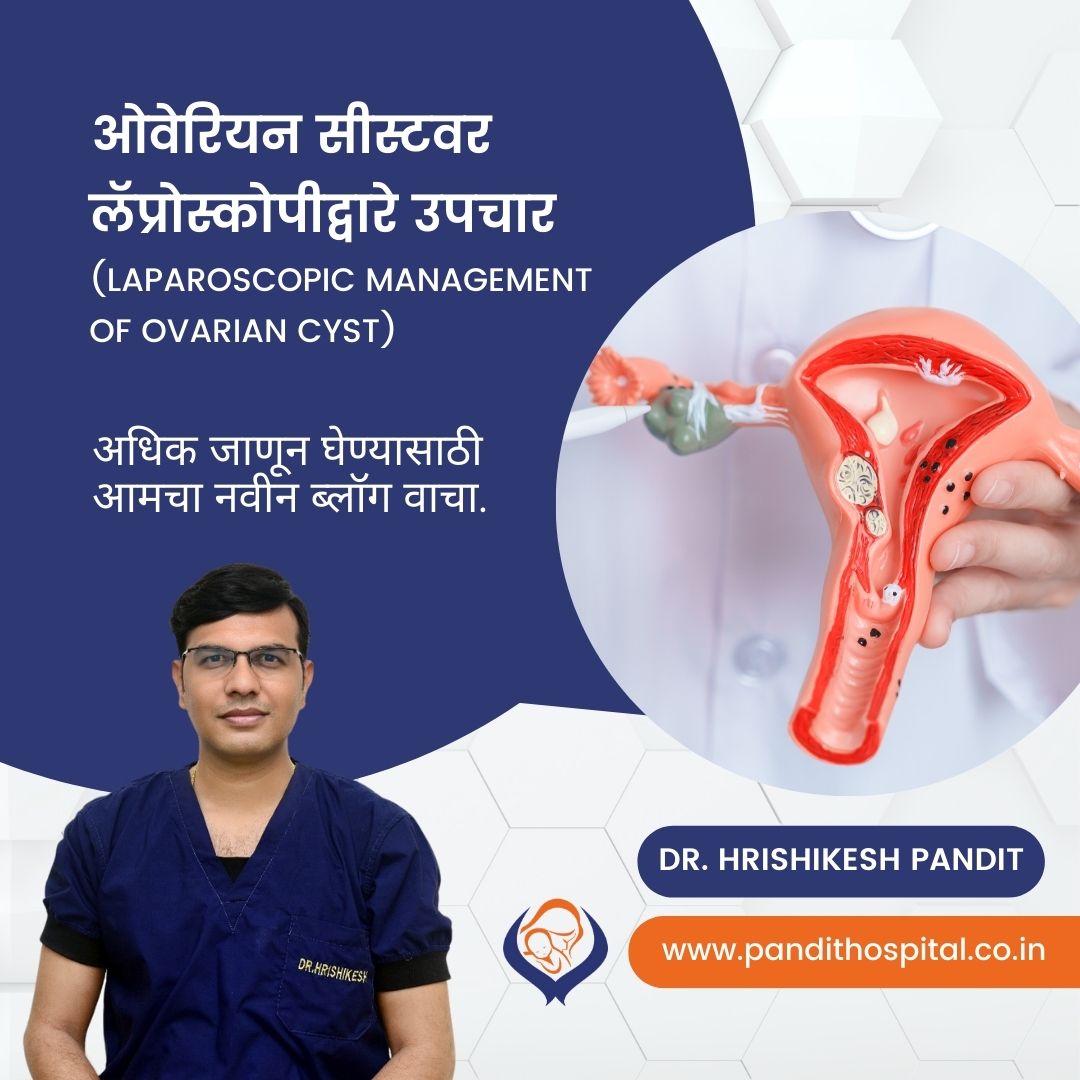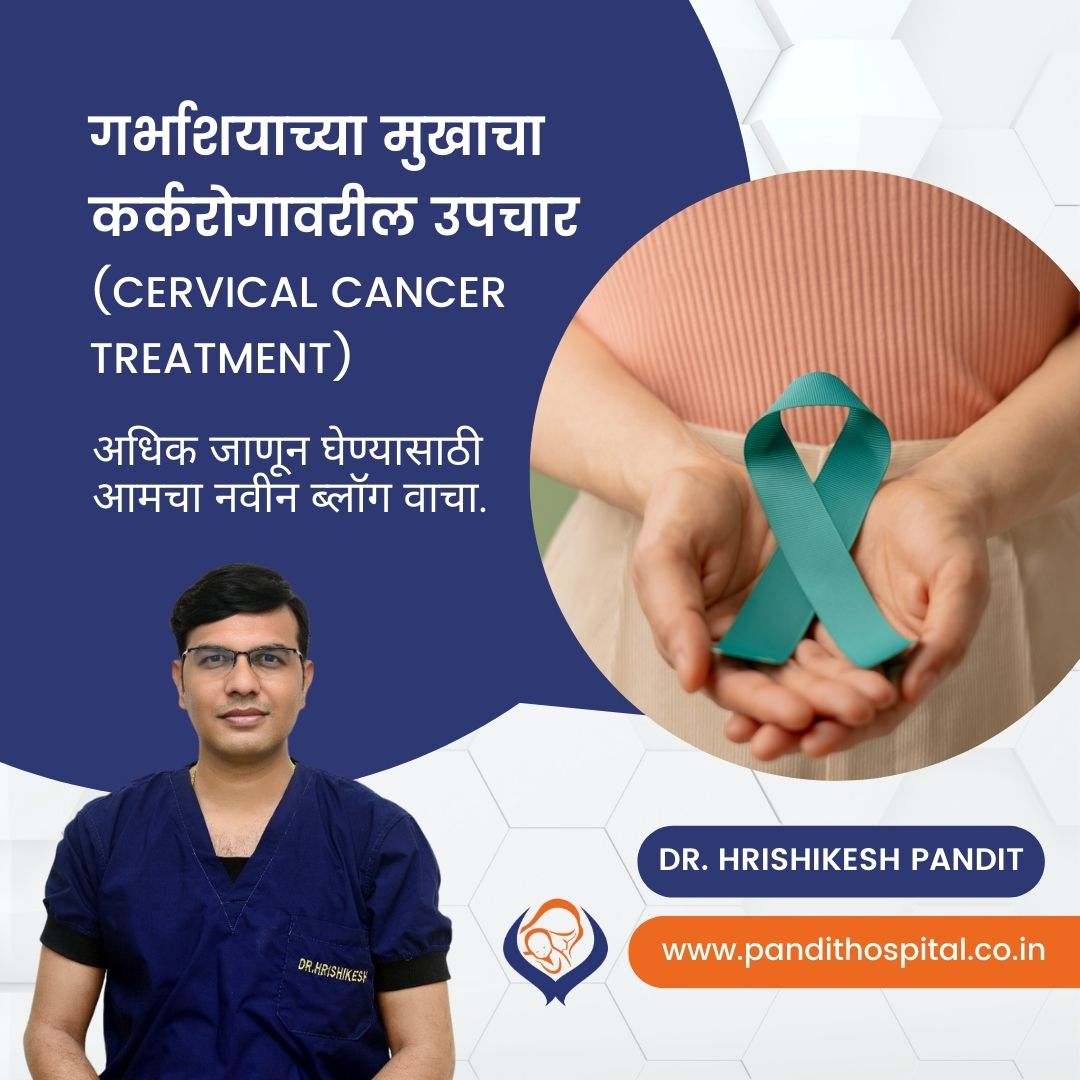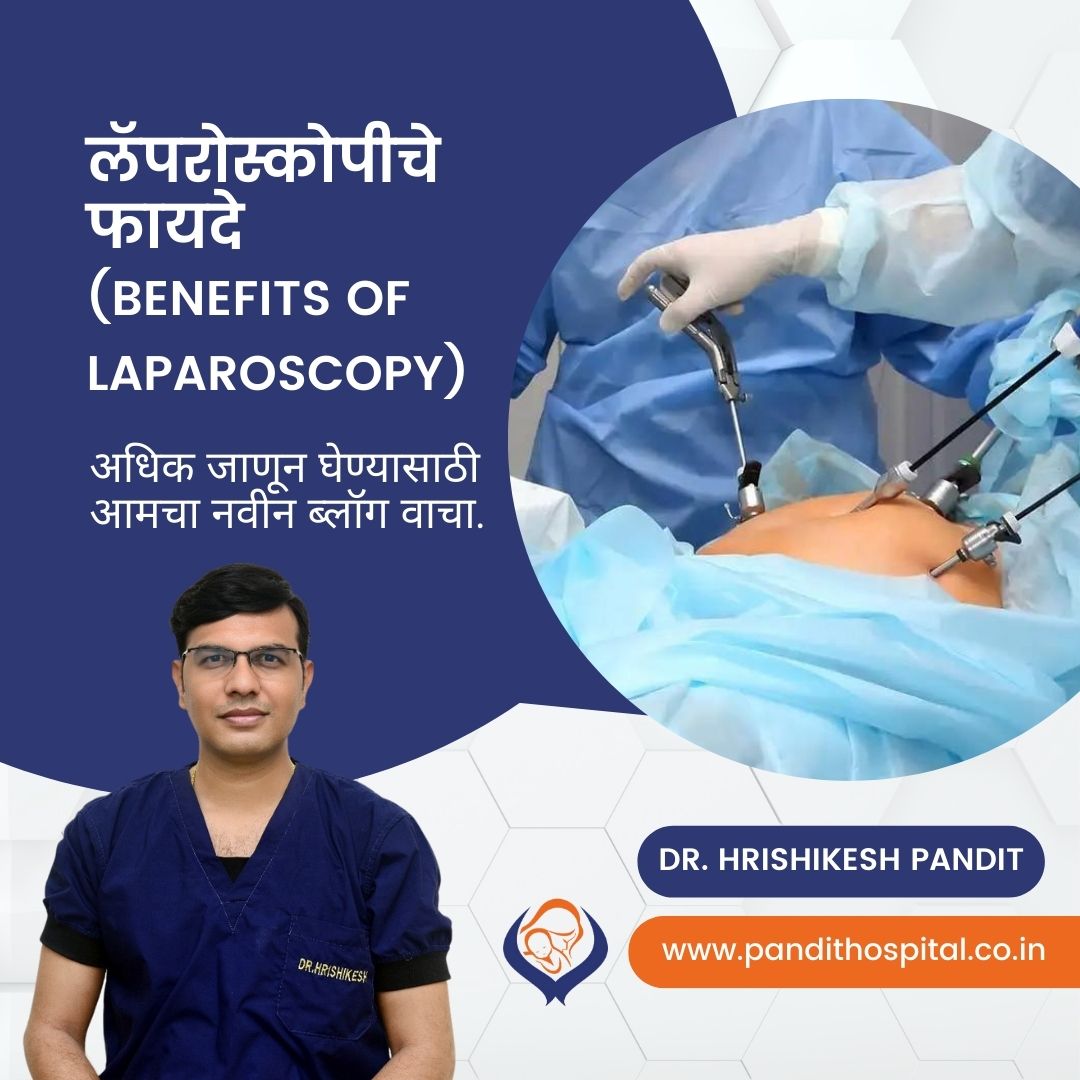In the field of gynecology, the name Dr. Hrishikesh Pandit stands out as a beacon of expertise, particularly in the field of laparoscopic surgeries. As one of the leading gynecologic laparoscopic surgeons in Ahmednagar, India, Dr. Hrishikesh Pandit provides valuable insights into post-surgery recovery for procedures such as hysterectomy, myomectomy, cystectomy, and more.
Read this blog in Marathi or Hindi
Immediately after surgery, it’s common to feel groggy or disoriented due to anesthesia. You may also experience some pain or discomfort at the incision sites. Our medical team will closely monitor your vital signs and manage any discomfort with appropriate medications.
The length of your hospital stay depends on the type of surgery performed and your individual recovery progress. Typically, patients undergoing laparoscopic gynecologic surgeries like hysterectomy, myomectomy, or cystectomy may stay in the hospital for 1-2 days. However, some patients may require a longer stay for monitoring or additional care.
We will prescribe pain medications to help manage any discomfort during your recovery period. Additionally, applying ice packs to the incision sites can help reduce swelling and pain. It’s essential to follow the medication schedule provided by your healthcare provider and avoid strenuous activities that could exacerbate pain.
The timeline for resuming normal activities varies depending on the type of surgery and individual healing. Generally, we advise patients to avoid work until they have stopped taking prescription pain medications and feel comfortable moving around without discomfort. Returning to work may take anywhere from 1-4 weeks, depending on the nature of your job and your overall recovery progress.
Keeping the incision sites clean and dry is crucial for preventing infection and promoting healing. We recommend gently washing the area with mild soap and water and patting it dry with a clean towel. Avoid scrubbing the incisions or applying any lotions or ointments unless instructed otherwise by your healthcare provider. It’s also essential to monitor the incision sites for signs of infection, such as redness, swelling, or drainage, and contact us immediately if you notice any concerning symptoms.
While complications are rare, it’s essential to be aware of potential risks associated with any surgical procedure. Some patients may experience temporary side effects such as fatigue, constipation, or changes in bladder function during the recovery period. However, these symptoms typically resolve on their own with time. In rare cases, complications such as infection, bleeding, or injury to surrounding organs may occur, but our medical team is trained to identify and manage any issues that arise.
Following a healthy lifestyle can significantly support your recovery and long-term health after gynecologic surgery. This includes eating a balanced diet, staying hydrated, getting regular exercise (once cleared by your surgeon), and avoiding tobacco. It’s also essential to attend follow-up appointments with surgeon to monitor your progress and address any concerns that may arise during the recovery process.
Dr. Hrishikesh Pandit and his team at Pandit Hospital, Ahmednagar are dedicated to providing comprehensive care and support to ensure a smooth recovery journey for all patients undergoing gynecologic laparoscopic surgeries. If you have any additional questions or concerns about your recovery process, don’t hesitate to reach out to our team for guidance and support.
At Pandit Hospital, you are in safe hands!
To consult Dr. Hrishikesh Pandit, Click Below,
Pandit Hospital – Best Maternity care center in Ahmednagar
LET’S SEE OUR INTRO VIDEO
At Pandit Hospital, we provide all the maternity services from antenatal to postnatal period under one roof
Let's Connect!!
0241-2441717 / 0241-2442344
About author:
Dr. Hrishikesh Pandit:
Dr. Hrishikesh Pandit is one of the best obstetrician and gynecologist in India. He is also a well-renowned Laparoscopic surgeon. He obtained his MS (Ob Gyn) degree from the prestigious Pravara Institute of Medical Sciences. He has also done fellowship and diploma courses in laparoscopic surgeries and cancer treatment from Tata Hospital and Keil University, Germany. His surgical cases, papers and videos has been chosen in many international forums of gynecology.
At Pandit Hospital, we are always working hard to provide its patients with the highest level of medical innovation and patient care. With the aim of delivering complete maternity & gynecological care under one roof with the help of all contemporary amenities and cutting-edge medical equipment. Dr. Hrishikesh Pandit has a vision to bring the best of facilities regarding laparoscopy surgeries in the city of Ahmednagar. He is the pioneer of 3D Laparoscopy technology is Ahmednagar.
Latest Articles
Dr. Hrishikesh Pandit is one of the best laparoscopy surgeons in India. His determination to bring 3D Laparoscopy technology to Ahmednagar has eventually helped so many patients. Read the latest articles by Dr. Hrishikesh Pandit on Gynecology, gastric issues, and health tips for mothers during pregnancy.
Discover comprehensive ovarian cyst treatments at Pandit Hospital in Ahmednagar, Maharashtra, led by 3D Laparoscopic Surgeon Dr. Hrishikesh Pandit. Learn about types, symptoms, and both surgical and non-surgical treatments. Best ovarian cyst removal hospital in India.
गर्भाशयाच्या मुखाचा कर्करोग हा महिलांमध्ये होणारा दुसरा सर्वात गंभीर कॅन्सर आहे. वयाच्या 35 व्या वर्षानंतर या आजाराचा धोका फार वाढतो. गर्भाशयाच्या कर्करोगावर लॅपरोस्कोपी (दुर्बिणीने) शस्त्रक्रियेद्वारे उपचार केले जाऊ शकतात.
लॅपरोस्कोपिक शस्त्रक्रियेचे अनेक फायदे आहेत ✔ कमी वेदना ✔ कमी रक्तस्त्राव ✔ रुग्णालयात किमान मुक्काम ✔ जलद रिकव्हरी ✔ कमी कॉम्प्लिकेशन्स ✔ कमी टाके ✔अंतर्गत अवयवांना कमी इजा. Benefits of laparoscopy &Marathi)
FAQ
You should consult a doctor during the first 6 to 8 weeks of your pregnancy, or when your period is 2 to 4 weeks late.
If your contractions are 5 minutes apart, lasting for 1 minute, for 1 hour or longer, it’s time to head to the hospital.
Doctors recommend an infertility evaluation if you have not gotten pregnant after 1 year of having regular sexual intercourse without using birth control. If you are older than 35, an evaluation is recommended after 6 months of trying.
Yes, You can. But most babies need 39 weeks to develop fully. Induced or planned delivery before that time—without a valid medical reason—is not in the best interest of the baby or the mother. After 39 weeks you can plan delivery.
Women who are 21 to 29 should have a Pap test alone every 3 years. HPV testing alone can be considered for women who are 25 to 29, but Pap tests are preferred. Women who are 30 to 65 have three options for testing. They can have a Pap test and an HPV test (co-testing) every 5 years. They can have a Pap test alone every 3 years. Or they can have HPV testing alone every 5 years.
Laparoscopic hysterectomy is a safe and suitable procedure for chosen patients. It affords patients advantages like less peri-operative morbidity, better life quality, shorter hospitalization time, and faster return to activity.
Schedule a doctor’s visit if you have: Greenish, yellowish, thick or cheesy vaginal discharge; Strong vaginal odor; Redness, itching, burning or irritation of your vagina or the area of skin that surrounds the vagina and urethra (vulva); Bleeding or spotting unrelated to your period.
Painless delivery can be achieved using a form of regional anesthesia that provides pain relief during natural labor. Epidural anesthesia is administered through an injection on the lower back of the mother. The drug takes about 10-15 minutes to take effect.
Even in severe cases of endometriosis, most can be treated with laparoscopic surgery. In laparoscopic surgery, your surgeon inserts a slender viewing instrument (laparoscope) through a small incision near your navel and inserts instruments to remove endometrial tissue through another small incision.
The HPV vaccine is recommended for routine vaccination at the age of 11 or 12 years. (Vaccination can be started at age 9.) It is also recommended that vaccination for everyone through age 26 years if not adequately vaccinated when younger. HPV vaccination is given as a series of either two or three doses, depending on age at initial vaccination.





